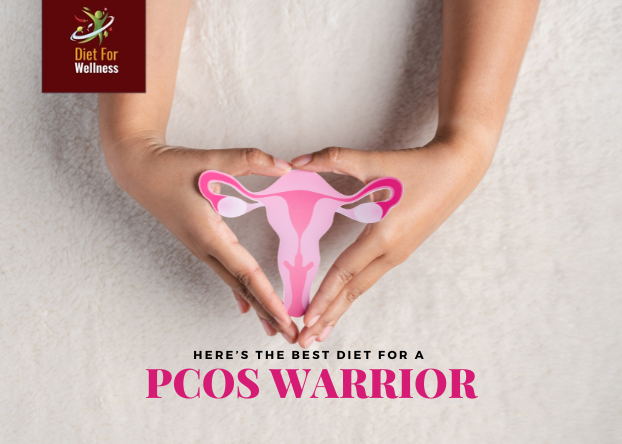Here’s the best diet for a PCOS warrior

Polycystic Ovary Syndrome (PCOS) is a hormonal disorder affecting 10% of women of reproductive age. It can impact overall health, appearance, and fertility. A healthy diet can help improve PCOS symptoms. Let’s explore how nutrition can help manage this condition.
The Power of Diet in Dealing with PCOS
Polycystic ovary syndrome (PCOS) is a hormonal disorder that can affect a woman’s menstrual cycle, fertility, and overall health. Many women with PCOS also struggle with obesity, inflammation, metabolic syndrome, insulin resistance, or a combination of these conditions, which can increase the risk of diabetes, heart disease, and other serious health issues.
Insulin Resistance Amidst This
A significant number of individuals with PCOS—between 50% and 75%—experience insulin resistance. Insulin, a hormone produced by the pancreas, acts like a key that unlocks cells to allow glucose (sugar) to enter. This glucose is then used as energy. However, in individuals with insulin resistance, the cells become less responsive to insulin, leading to a buildup of glucose in the bloodstream and fat cells. This can ultimately contribute to the development of diabetes.
The Role of Diet and Exercise
While not all women with PCOS develop these complications, maintaining a healthy weight through diet and exercise is crucial for those who do. A healthy weight can help regulate hormones, improve insulin sensitivity, and reduce the risk of associated health problems.
The Mediterranean Diet- A Healthy Choice for PCOS
While individual needs may vary, the Mediterranean diet is often recommended by healthcare professionals for individuals with PCOS.
This diet emphasizes
Plenty of fruits, vegetables, and whole grain
These foods are rich in fiber, vitamins, and minerals, which can help regulate blood sugar levels and promote overall health.
Lean protein sources
Fish, poultry, and legumes are excellent sources of protein that can help you feel full and satisfied.
Healthy fats
Olive oil, nuts, and seeds are rich in healthy fats that can help reduce inflammation and improve insulin sensitivity.
Limited processed foods, sugary drinks, and red meat
These foods add to weight gain, inflammation, and insulin resistance.
You can take significant steps toward managing PCOS and improving your overall health by incorporating these dietary principles into your lifestyle.
Foods to Embrace for PCOS Well-being
A PCOS-friendly diet often revolves around fresh, whole foods. Incorporating these nutrient-rich options supports your overall health and manage PCOS symptoms-
Veggie Powerhouses
- Leafy Greens– Kale, spinach, and other dark, leafy greens are packed with essential vitamins and minerals.
- Cruciferous Crops– Broccoli and cauliflower offer fiber and antioxidants.
- Colorful Choices– Dark red fruits like grapes, blueberries, and cherries provide powerful antioxidants.
Protein-Packed Picks
- Fatty Fish– Salmon, tuna, sardines, and mackerel are excellent sources of omega-3 fatty acids.
- Plant-Based Proteins– Lentils, beans, and nuts offer fiber and protein without the saturated fat.
Healthy Fats
- Olive Oil– A heart-healthy fat that can be used for cooking and drizzling.
- Avocados– Creamy and nutrient-dense, avocados are a great source of healthy fats.
Sweet Treats (in Moderation)
- Dark Chocolate– Opt for dark chocolate with a high cocoa content for antioxidants.
Flavorful Additions
- Spices– Turmeric and cinnamon can add flavor and potential health benefits to your meals.
Weight Management Matters
Maintaining a healthy weight can help improve PCOS symptoms. A balanced diet combined with regular physical activity are keys to achieving and maintaining a healthy weight.
Foods to Limit or Avoid
To minimize the risk of complications associated with PCOS, consider limiting or avoiding these foods:
- Refined Carbs– White bread, pastries, and sugary cereals can spike blood sugar levels.
- Fried Foods– These are high in unhealthy fats and calories.
- Sugary Drinks– Sodas and energy drinks contribute excess sugar and calories.
- Processed Meats– Hot dogs, sausages, and luncheon meats are linked to various health issues.
- Solid Fats– Margarine, shortening, and lard can raise bad cholesterol levels.
- Red Meat- Limit red meat intake to reduce the risk of certain health problems.
- Highly Processed Foods– These often contain unhealthy additives and excessive sodium.
Make informed food choices and incorporate regular physical activity and manage PCOS and improve your overall well-being.
Feeling frustrated with PCOS?
Living with PCOS can be tough, but you’re not alone. Making simple dietary and lifestyle changes can significantly improve your mood and alleviate common symptoms.
Nourish your body, not your cravings.
While some foods might need to be limited, remember, there are healthier alternatives. Swap margarine and white toast for a hearty breakfast of whole-grain bread, olive oil, and avocado.
Don’t let symptoms hold you back.
If your symptoms persist, consult a healthcare professional. They can help identify the root cause and recommend personalized treatment options.
